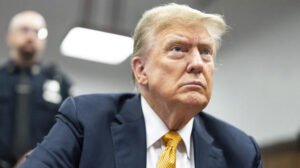On Wednesday, Former President Donald Trump expressed intense frustration as the jury in his New York City criminal case began deliberations. Trump, facing 34 felony charges related to alleged hush money payments, declared that even “Mother Teresa could not beat these charges,” emphasizing his belief that the case is unfairly stacked against him.
Jury Deliberations Begin
The jury, composed of 12 New Yorkers, started deliberations behind closed doors on Wednesday, May 29, 2024. Trump and his legal team have been required to stay at the courthouse during this process. Judge Juan Merchan delivered detailed instructions to the jurors, reminding them of their duty to impartially evaluate the evidence presented over the past five weeks. The charges hinge on the accusation that Trump falsified business records to conceal a $130,000 payment to adult film actress Stormy Daniels, allegedly intended to silence her about an affair with Trump a decade earlier.
Trump’s Defiant Stance
Speaking to reporters, Trump reiterated his claims that the trial is politically motivated and part of a broader effort to undermine his 2024 presidential campaign. He accused the judge of being biased and criticized the entire legal process. “What is happening here is weaponization at a level that nobody’s seen before ever and it shouldn’t be allowed to happen,” Trump stated, also attacking his political rival, President Joe Biden, despite there being no evidence of Biden’s involvement in the case.
Key Testimonies Revisited
During their first day of deliberations, jurors requested to rehear key testimonies, including those of Michael Cohen, Trump’s former lawyer, and David Pecker, former publisher of The National Enquirer. Cohen, the prosecution’s star witness, testified that he paid Daniels at Trump’s direction to prevent damage to Trump’s 2016 presidential campaign. The jury also sought clarification on Pecker’s testimony regarding his interactions with Trump about hush money payments and the purchase of life rights to stories from other individuals claiming affairs with Trump.

The Judge’s Instructions
Judge Merchan instructed the jury to scrutinize Cohen’s testimony carefully, acknowledging his role as an accomplice in the alleged crimes. Merchan emphasized that the prosecution bears the burden of proof and that Trump’s decision not to testify should not be held against him. To convict Trump of felony falsifying business records, jurors must find that he intended to conceal another crime, specifically a violation of New York Election Law 17-152, which pertains to unlawful efforts to influence an election.
Potential Consequences
If convicted, Trump could face up to four years in prison, although imprisonment is unlikely for a first-time offender convicted of this type of crime. The outcome of this case could significantly impact Trump’s political future as he seeks the Republican nomination for the 2024 presidential election.
Closing Arguments
In the trial’s closing arguments, the prosecution argued that Trump’s actions were part of a larger scheme to conceal damaging information and secure his election victory. Assistant Manhattan District Attorney Joshua Steingass contended that Trump’s actions were driven by a desire to benefit himself politically. In contrast, Trump’s defense team portrayed Cohen as a liar with a vendetta against Trump, insisting there is no proof Trump was aware of the payment before it was made.
A Contentious Trial
Throughout the trial, Trump maintained his innocence and denounced the charges as part of a broader campaign to derail his political ambitions. His legal troubles extend beyond this case, with three other criminal cases pending, none of which are expected to go to trial before the 2024 election.
Waiting for the Verdict
As the jury continues its deliberations, the nation watches closely. The case marks the first time a former U.S. president has faced criminal charges, adding to its historical significance. Whether the jury will reach a unanimous decision, or a mistrial will be declared if they remain deadlocked, the outcome will have profound implications for Trump and the broader political landscape.
Trump’s defiant stance and claims of a rigged system are likely to continue shaping the narrative around this case, regardless of the verdict. His supporters and detractors remain deeply polarized, reflecting the contentious nature of his presidency and ongoing political influence.











